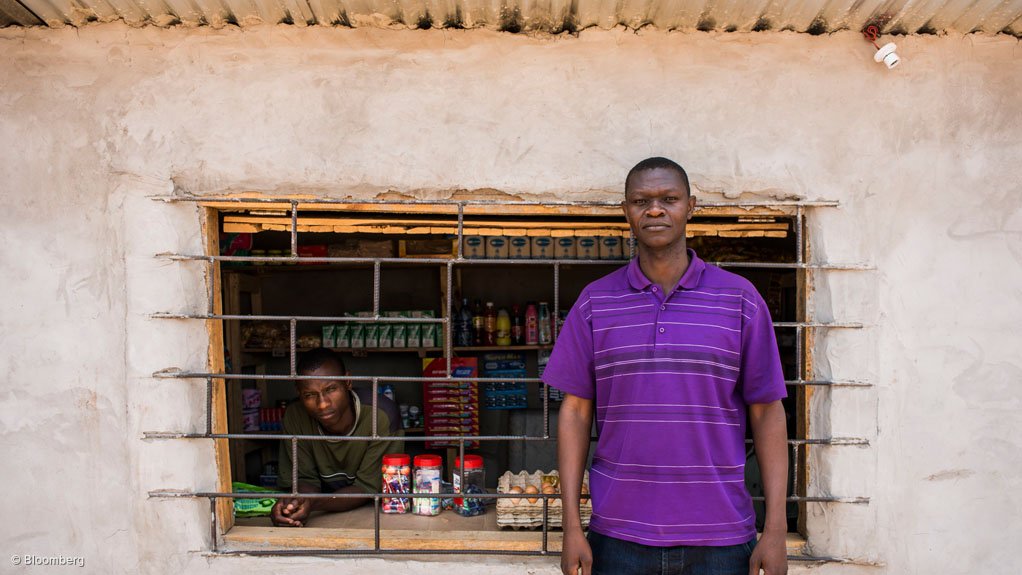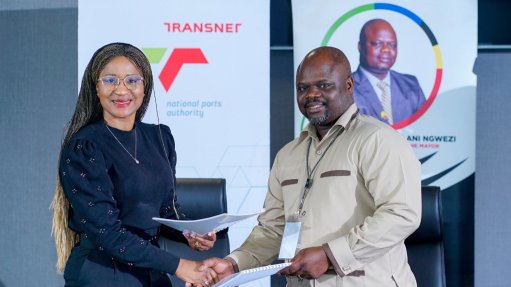Small businesses need support as they take heavy strain from loadshedding crisis


Small businesses are struggling to keep operating during loadshedding
Photo by Bloomberg
Up to 64% of small businesses in South Africa's townships stop operating when there is loadshedding, about 60% have had to reduce employee numbers to survive and about 7% have permanently shut their businesses as the costs to trade had become unrecoverable.
These were some of the findings of a recent study presented during a webinar, titled 'The Energy Crisis: What is being done to support small businesses?' hosted by small enterprise institution the Small Business Institute on June 20.
Research organisation the Township Economy Alliance (TEA) founder Bulelani Balabala said the TEA had conducted research into the impact of loadshedding on township enterprises and polled about 1 500 small businesses over the past three months.
The results indicate a significant negative impact on informal and formal township businesses owing to loadshedding. For example, the use of generators by township businesses in the manufacturing space has increased their costs and their biggest challenge was to achieve a balance between recovering their increased costs and pricing their products to remain competitive in their markets.
Additionally, despite some manufacturers having switched to working in shifts and having reduced wages, if they experienced four hours of loadshedding a day, they could only do four hours of work a day. Some also reported that clients cancelled orders because it took the enterprise longer to deliver a finished product, he added.
However, about 17% of the businesses were able to improvise to continue operating and about 19% had deployed alternative energy sources to sustain their operations, he said.
"While some businesses were able to offset the impact of loadshedding, such as by switching to gas stoves in the food industry and using batteries to power lighting, a theme we identified in the majority of businesses is that they had to pivot in one way or another to navigate the crisis," Balabala said.
The research, conducted in partnership with financial services firm Nedbank, recommended that to assist township businesses to overcome the impact of loadshedding the length of loadshedding should be reduced to one hour.
Further, introducing affordable solutions can help, and small businesses should be provided with tools to navigate the alternative energy sector, as they often lack sufficient information about what solutions would be suitable for their operations.
Additionally, the TEA recommended that township businesses be provided with external funding support, as switching over to suitable solutions was expensive and sometimes prohibitively so, he noted.
"The reality is that small businesses that cannot afford alternative power find themselves yet again excluded from the economy," said Balabala.
The impact of loadshedding on small, medium-sized and microenterprises (SMMEs) is tangible and visible on a daily basis. Some businesses can cope better than others, but those without the necessary financial reserves to put alternative energy solutions in place suffered bitterly, said business loan provider Business Partners executive director and chief investment officer Jeremy Lang.
"Some businesses are able to work around the impact of loadshedding, such as through introducing shifts, but other businesses cannot and lost turnover cannot be recovered. Further, loadshedding is leading to margin squeeze while businesses are experiencing overhead creep, such as through tariff increases and high interest rates.
"It is critical to support SMMEs through such periods, as we are seeing increased levels of liquidation and job losses. No one institution or organisation can solve this problem, and it requires a concerted effort by the public and private sectors to address," he said.
Further, the solutions must not be cumbersome for SMMEs and must be concessionary in nature and easily accessible, he added.
Business Partners has launched a R400-million fund to support SMMEs to procure alternative energy supply for their businesses to provide more consistent and predictable energy, as well as hopefully reduce their costs over the medium term.
Funding of between R250 000 and R2-million was available for SMMEs looking to install alternative energy solutions, with Business Partners keenly focused on ensuring that the alternative energy solutions were of high quality and that the suppliers and installers were credible and accredited, Lang noted.
Meanwhile, the National Treasury would launch a loan guarantee scheme aimed at helping to address the energy constraints experienced by SMMEs, hopefully within the next week, Treasury financial sector policy chief director Vukile Davidson said.
"However, our experiences with loan guarantee schemes during the Covid-19 impacted period has shown that outcomes tend to be better when we work in partnerships. We need to leverage the respective strengths of various institutional players, including banks and non-bank financial services providers who understand their clients well. We have also worked with these role-players in designing the distribution mechanisms," he said.
Additionally, Treasury s taking ai modular approach in which it aims to understand what interventions work well and then scale those up, rather than taking a blanket approach under which some mechanisms are not fit for purpose.
"The objectives of the loan guarantee scheme are to improve reliability of energy available to SMMEs and to improve the energy output. However, we are also focusing on reducing single points of failure, which means that solutions must be distributed," he added.
The scheme will have three main interventions, including a capital investment mechanism for SMMEs that are in a position to take on more capital debt, such that they can borrow and install alternative energy solutions.
The second intervention will see the scheme provide leasing, pay-as-you-go and loan-to-own finances to energy service companies to improve access for SMMEs.
This was important as most SMMEs did not want to take on additional debt without a corresponding increase in output. The aim of this intervention was to keep the costs of energy for SMMEs the same while ensuring reliability without dramatic 20% or higher increases in energy tariffs, said Davidson.
"We are also working to ensure that energy service companies have sufficient funding and working capital to meet increased demand," he added.
Treasury also aims to alleviate other bottlenecks and constraints, such as ensuring there is sufficient working capital available in the solar energy sector to meet increased demand, and it is looking to support new entrants into the energy services space to make the environment as competitive as possible.
"Through the scheme, we are aiming to support the addition of 1 000 MW every year and, thereby, we hope to alleviate some of the pressures felt by small businesses."
Further, the Department of Small Business Development (DSBD) had launched its Catalytic SMME fund as part of its green economy initiative, said DSBD chief director Vijay Valla.
While Treasury aimed to support such initiatives, it cannot provide sufficient resources to transition the small business sector to green energy. Therefore, the initiative aimed to tap multilateral donors, development finance institutions and other organisations that wanted to encourage the move to a green economy in Africa, he said.
The funding support for SMMEs to secure renewable energy solutions provided through this initiative contained concessionary grant funding, depending on the size of the business. Informal businesses could receive funding of which 90% to 100% took the form of a grant, while larger businesses could receive funding support of which between 30% and 70% could be in the form of a grant, he noted.
Additionally, depending on the scope of the solution in terms of actively moving towards a green economy, the loan terms can range from two years to five years.
"We want to be able to mitigate electricity challenges for small businesses in parallel with creating a green economy that is more resilient to climate change," Valla said.
"Further, we have researched and identified opportunities for township and rural enterprises to participate in a more resilient green economy along the value chain, including in consulting, generation, installation, and maintenance and repairs. There is plenty of scope for SMMEs to participate in the green economy."
While the loans were in the R50 000 to R100 000 range, the DSBD was also open to leveraging blended finance models in partnership with other government departments, nongovernmental organisations and private organisations to support the transition of small businesses to green energy, Valla said.
Article Enquiry
Email Article
Save Article
Feedback
To advertise email advertising@creamermedia.co.za or click here
Comments
Press Office
Announcements
What's On
Subscribe to improve your user experience...
Option 1 (equivalent of R125 a month):
Receive a weekly copy of Creamer Media's Engineering News & Mining Weekly magazine
(print copy for those in South Africa and e-magazine for those outside of South Africa)
Receive daily email newsletters
Access to full search results
Access archive of magazine back copies
Access to Projects in Progress
Access to ONE Research Report of your choice in PDF format
Option 2 (equivalent of R375 a month):
All benefits from Option 1
PLUS
Access to Creamer Media's Research Channel Africa for ALL Research Reports, in PDF format, on various industrial and mining sectors
including Electricity; Water; Energy Transition; Hydrogen; Roads, Rail and Ports; Coal; Gold; Platinum; Battery Metals; etc.
Already a subscriber?
Forgotten your password?
Receive weekly copy of Creamer Media's Engineering News & Mining Weekly magazine (print copy for those in South Africa and e-magazine for those outside of South Africa)
➕
Recieve daily email newsletters
➕
Access to full search results
➕
Access archive of magazine back copies
➕
Access to Projects in Progress
➕
Access to ONE Research Report of your choice in PDF format
RESEARCH CHANNEL AFRICA
R4500 (equivalent of R375 a month)
SUBSCRIBEAll benefits from Option 1
➕
Access to Creamer Media's Research Channel Africa for ALL Research Reports on various industrial and mining sectors, in PDF format, including on:
Electricity
➕
Water
➕
Energy Transition
➕
Hydrogen
➕
Roads, Rail and Ports
➕
Coal
➕
Gold
➕
Platinum
➕
Battery Metals
➕
etc.
Receive all benefits from Option 1 or Option 2 delivered to numerous people at your company
➕
Multiple User names and Passwords for simultaneous log-ins
➕
Intranet integration access to all in your organisation



















